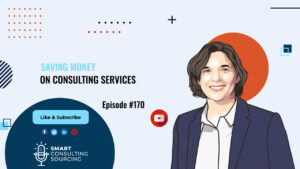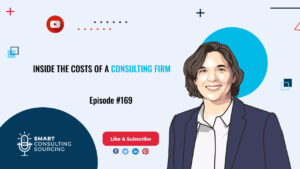Hello and welcome to episode 68 of our podcast: Smart Consulting Sourcing, THE podcast about Consulting Procurement.
My name is Hélène, and I’ll be your host today.
Each week I’ll give you the keys to better use, manage and source consulting services.
In Last week’s episode, I talked about consulting fees and rates
The time spent on a project is the major driver of cost for consultants since they are mostly selling their time. The price is usually calculated as the product of the daily rate per the number of days worked on the job.
There are several fee structures. The most common is the flat fee where the Consultant will evaluate the work to be done and the deliverables to be prepared, and define the expertise and time needed to deliver the project. But you can also find daily rates, performance-based fees and many others.
Finally, project fee structures might be a mix of these fee structures. And I hope that you know now why it is so important to understand the cost structure of a consulting firm and how consultants build their prices.
But this week I’d like to explain how to work with consultants.
When you’re purchasing services, particularly intangible ones like consulting, the bulk of the work happens after the transaction is completed. You must keep track of and manage both the outcomes of the project and the process itself. In reality, consultation projects rarely go as planned.
Get organized even when you work with consultants
Let’s get started with my first advice: To properly manage your project, get organized.
Managing a consulting project is, first and foremost, about managing a project. The same rules apply. So you’ll need to manage three aspects to increase the likelihood of success: the stakeholders, the project and the change.
Let’s start with managing the stakeholders. The management of stakeholder expectations is an essential part of consulting work. Whether you manage your projects in-house or via a Consulting firm, managing Stakeholders is a necessary component of project management. Make sure the stakeholders are aligned on the expectations and work together with the project team and consultants.
Now, manage the project.
A good place to start is establishing Milestones and Expectations, also called the work plan. Both your organization’s executives and consultants should agree on Milestones and expectations. Then, you will need to clarify the roles and responsibilities and establish clear governance.
And finally, manage the change. Change management is unfortunately frequently neglected. But it is a key success factor for consulting projects. Try to anticipate the resistance to change in the teams affected by the project and devise tactics for each scenario. Change management should be the responsibility of all stakeholders.
Advice number 2: Keep track of the performance.
After the project starts, you should stay on top of it. How effective is the project team? Are we meeting milestones and expectations?
Don’t wait until the project is finished to evaluate its success and share your feedback with the consultants. Low performance might result from a variety of factors working together at once. It might have to do with the Consultants (capabilities, skills, experience, staffing, and so on) or your teams (low priority).
Whatever the reason, take the time to sit down with your consultants to discuss the problem and fix it together.
Advice number 3: Manage the Consulting contract and the relationship.
Managing a project that includes external consultants can be tricky. Some people manage it (successfully) by managing the relationship and then the contract, but the reality is that this only works well when there’s a strong personal connection.
It’d be even better if you managed both the relationships and the contracts in parallel.
Developing a good relationship is crucial to the success of the project. You don’t need to like them but trust their ability to deliver.
First thing: track changes. During a project, many things can evolve like the scope, the staffing, the timeline, or you might face some unforeseen events. When these changes are significant, it’s usually worth amending the contract. Keep track of any modifications made in the minutes of the Steering Committees no matter how minor they are.
For huge projects, it’s a good idea to hold a formal mid-project review. You may address both the statement of work modifications and the quality of the work already delivered.
It shouldn’t prevent you from checking in on a regular basis with the Consulting Firm to anticipate project scope and schedule changes, allowing your provider to correct the problem.
Now advice number 4: When the Consultant leaves, be ready for it.
A consulting project has a start and an end. When the Consultant leaves, make sure you manage it and don’t be surprised by the departure of your Consulting Firm. Prepare the transition from the start in other words, in your RFP. What does that mean? Well, try to include the transition plan and regular check-ins in the deliverables.
When that’s not possible, plan the transition. Usually, a consulting project ends with a set of recommendations: decide which ones you want to keep and how you want to implement them. Take advantage of the consultants to understand the impact of your choice, in particular, if you don’t keep all their recommendations.
When you have implemented a new organization or technology, you might want some knowledge transfer for instance. Make sure to plan the transfer with the consultants, even if it means buying a sequel to your project.
And finally, collect information during the project to prepare the performance assessment for the Consulting Firm. Collect data on the quality of their work, but also on the challenges you faced and how they managed them.
Let’s hear my fifth Advice: don’t be afraid to terminate the project earlier than expected.
A lot can change between the moment you decide to work with consultants and the conclusion of their projects. It can be the context of your project for instance.
Or the management team has changed: the project sponsor has decided to quit for instance. If that’s the case, continuing with the project as it is may be a waste of time and money. Always look for ways to make the scope more suited to your needs.
If you must make a termination decision, consider all of the ramifications.
And finally, advice number 6: Close the project in a professional manner.
Don’t be in a hurry to cut your project short, no matter what the reason. Take some time to consider the impact of the cancellation and whether or not another consulting project has a better chance of success. Also, make arrangements for how you’ll inform your team members about the termination.
At that time, you should have paid the consulting firm based on the delivery and accrued the budget until the project’s conclusion.
Keep all outstanding invoices on your desk until you’re absolutely sure the work is completed. That will give you ample leverage to bring the project to a close.
When you think the project is finished and the invoices have been authorized for payment, take some time to debrief the consultants on their performance.
It can also be a good opportunity for you to learn from this experience. You’ll want to assess how well they met your expectations and what they could have done better. Give them some bone to chew on and improve their delivery.
In conclusion
You should manage the consulting project as you manage any other projects. Keep control of the deliverables, the change, and the conclusion of your project. Fix the problems when you can and terminate the project if you must. And don’t forget to anticipate the transition after the Consultant leaves.
You now have six pieces of advice to manage your Consulting Firm, but no doubt you’ll find your own keys to success through trial and error.
And that marks this end of our podcast folks. Next week, I’ll tell you how to manage the relationships with your consulting suppliers. Procurement executives have a lot on their plate – from ensuring the organization gets the best deals on goods and services, to working with suppliers to make sure everything is running smoothly. And when it comes to working with consultants, things can get even more complicated. How do you make sure you’re getting the most out of your relationship with them?
Hope to see you next Thursday! And until then, stay safe & happy sourcing!
Don’t forget to follow me on Linkedin, Twitter, and Facebook if you enjoyed this podcast. I publish regularly on the topic.
If you have other questions about managing a project with a consulting firm, remember you can contact me directly on Linkedin or by email at helene.laffitte@consultingquest.com. Because I am always game for a chat!
If you want more episodes or read the transcript of this podcast, you can find them on consulting.wiki or our Youtube channel.
You can also have a look at our website consultingquest.com to know more about our book, our publications, and our services to improve your consulting sourcing.
Bye and see you next week! Au revoir!







